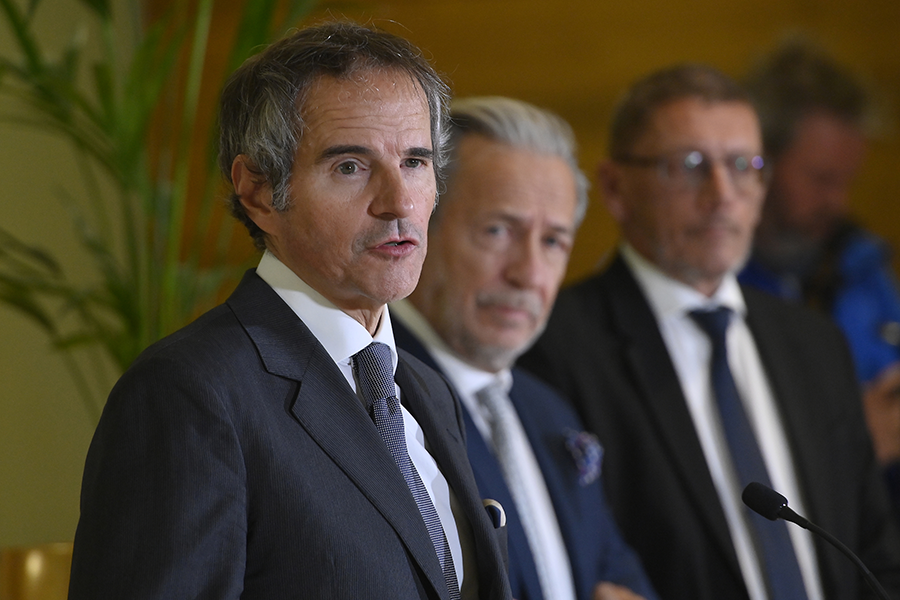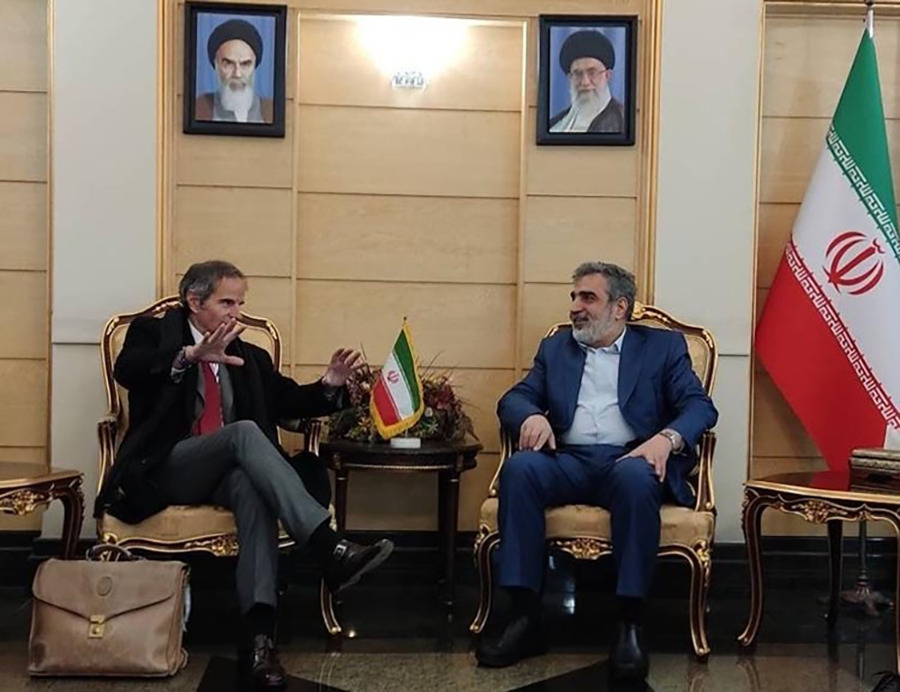“For half a century, ACA has been providing the world … with advocacy, analysis, and awareness on some of the most critical topics of international peace and security, including on how to achieve our common, shared goal of a world free of nuclear weapons.”
Iran Agrees to Increase Nuclear Transparency
April 2023
By Kelsey Davenport
Iran and the International Atomic Energy Agency (IAEA) reached an agreement to increase agency monitoring over the country’s nuclear program, but the deal is unlikely to be sufficient to quell concerns about Tehran’s sensitive activities.
 IAEA Director-General Rafael Mariano Grossi traveled to Tehran on March 3–4 to discuss agency concerns about safeguarding Iran’s nuclear program. In a March 4 statement, the IAEA and the Atomic Energy Organization of Iran (AEOI) announced that Tehran would “on a voluntary basis” allow the agency to “implement further appropriate verification and monitoring activities.”
IAEA Director-General Rafael Mariano Grossi traveled to Tehran on March 3–4 to discuss agency concerns about safeguarding Iran’s nuclear program. In a March 4 statement, the IAEA and the Atomic Energy Organization of Iran (AEOI) announced that Tehran would “on a voluntary basis” allow the agency to “implement further appropriate verification and monitoring activities.”
U.S. State Department spokesman Ned Price said on March 6 that Iran must cooperate and take the agreed steps “without delay.”
Although Grossi has raised concerns for months about the implications of Iran’s decisions in 2021 and 2022 to reduce inspector access and transparency, recent events highlighted the risk posed by monitoring limitations. In January, IAEA inspectors at the Fordow uranium-enrichment facility determined that Iran was operating its two cascades of more efficient IR-6 centrifuges in a design that was significantly different from what was declared to the agency. The IAEA concluded in a Feb. 1 report that the reconfiguration of centrifuges should have been declared to that agency as required by the country’s safeguards agreement.
Inspectors took samples from the Fordow site the day after they noticed the centrifuge reconfiguration, which revealed the presence of uranium enriched to 84 percent uranium-235, significantly above the declared levels of 60 percent U-235 for that area of the facility.
These undeclared activities are particularly concerning given the advanced nature of Iran’s nuclear program. The IAEA’s Feb. 28 report revealed that Tehran doubled its production of uranium enriched to 60 percent U-235 since the prior report was issued in November. Tehran now has enough material enriched to that level to produce weapons-grade uranium, or 90 percent U-235, for two bombs.
In the report, the agency said Iran described the spike in enrichment as an “unintended fluctuation” that occurred when it began enriching uranium to 60 percent U-235 or when it changed the feed cylinder.
Laura Holgate, U.S. ambassador to the IAEA, told the agency’s Board of Governors on March 8 that Iran’s activities at Fordow, whether intentional or inadvertent, “intensify tension and push unprecedented boundaries.” She said Iran must clarify the origins of the 84 percent U-235 material immediately.
In a March 4 press conference, Grossi said that it is not the IAEA’s job to determine Iran’s intentions, but said the agency must understand what occurred for safeguards purposes. He said discussions regarding the particles are ongoing.
Grossi also said that Tehran agreed in February to a 50 percent increase in inspections at the Fordow facility. AEOI spokesman Behrouz Kamalvandi confirmed the additional inspections, but other comments seemed to contradict Grossi’s description of the additional measures covered by the March 4 agreement.
 At the press conference, Grossi suggested that Iran agreed to reinstall surveillance equipment, including cameras and a monitor that tracked Iranian uranium enrichment in real time, that Tehran disconnected in June 2022. But Kamalvandi suggested that Iran will not install any new cameras or take steps contrary to a December 2020 nuclear law that required the AEOI to halt more intrusive access for inspectors and certain transparency measures specific to the 2015 Iran nuclear deal, formally known as the Joint Comprehensive Plan of Action (JCPOA).
At the press conference, Grossi suggested that Iran agreed to reinstall surveillance equipment, including cameras and a monitor that tracked Iranian uranium enrichment in real time, that Tehran disconnected in June 2022. But Kamalvandi suggested that Iran will not install any new cameras or take steps contrary to a December 2020 nuclear law that required the AEOI to halt more intrusive access for inspectors and certain transparency measures specific to the 2015 Iran nuclear deal, formally known as the Joint Comprehensive Plan of Action (JCPOA).
After the December 2020 law came into effect, the AEOI did allow monitoring equipment to surveil certain facilities to which Iran suspended IAEA access in February 2021. Iran said it would turn the data over to the agency if the JCPOA were restored. Kamalvandi’s comments cast doubt on whether the IAEA will be able to install any equipment at new sites or facilities that have been modified. It is also not clear if the March 4 agreement will allow the agency to access that data or if the IAEA will have regular access to any future recordings.
In a March 7 statement to the IAEA Board of Governors, France, Germany, and the United Kingdom urged Iran to install all the equipment that the agency deems necessary.
Grossi has warned since June that the monitoring gap will make it difficult for the agency to maintain its continuity of knowledge over Iran’s nuclear program. For the first time, in the Feb. 28 report, the agency concluded that it is no longer possible to restore continuity of knowledge and that reestablishing baselines in areas such as inventories of centrifuge components and uranium ore concentrate stocks will have a significant degree of uncertainty. This will make verifying limits under a restored JCPOA more challenging, the report noted.
The March 7 statement also covered a years-long IAEA investigation into the presence of processed uranium at three locations that were not declared to the agency under Iran’s safeguards agreement. For more than two years, the agency has sought technically credible explanations from Iran for the uranium, which was processed prior to 2003.
The March 4 agreement states that Iran “expressed its readiness” to provide the agency with “further information and access” to resolve the probe. Grossi said that day that Iran agreed to allow inspectors access to sites, locations, and individuals.
But Kamalvandi said there was no discussion of access to individuals and that Tehran would have turned down any such request. He also said there is no need for the IAEA to return to the three sites under investigation.
When pressed about Kamalvandi’s comments, Grossi on March 6 defended the progress made, saying that he reached a new understanding with Iranian officials regarding the investigation.
The Board of Governors censured Iran for failing to cooperate with the IAEA investigation while meeting in November. Although the states did not pursue a censure during the March 6–10 board meeting, France, Germany, and the UK warned about future action if Iran does not cooperate.
They said in a March 8 statement that the IAEA has “heard enough promises” from Iran and that the board will “have to be prepared to take further action” if Tehran does not cooperate. This could include referring Iran to the UN Security Council.
While in Tehran, Grossi said that any attack on a nuclear facility is illegal. Israeli Prime Minister Benjamin Netanyahu described the statement as “unworthy” during a March 5 cabinet meeting and said that “nothing will prevent us from protecting our country.”
In the past, Israel has taken credit for attacks on Iranian nuclear facilities and the assassination of Iranian nuclear scientists.
